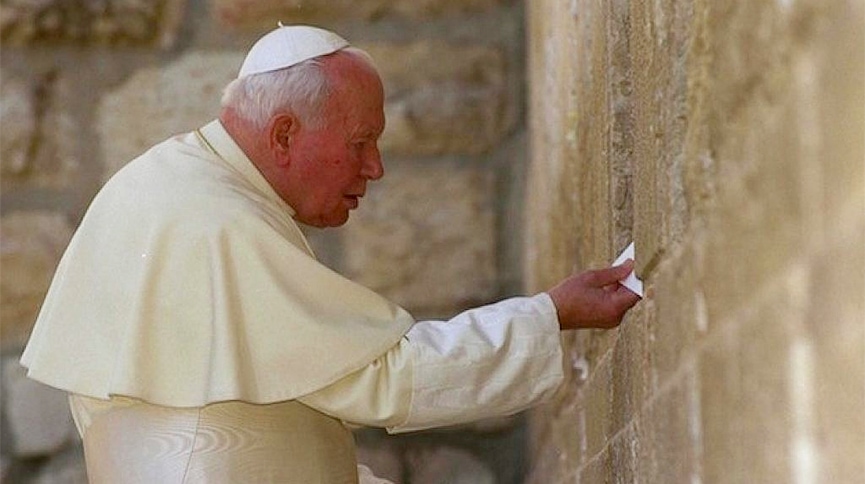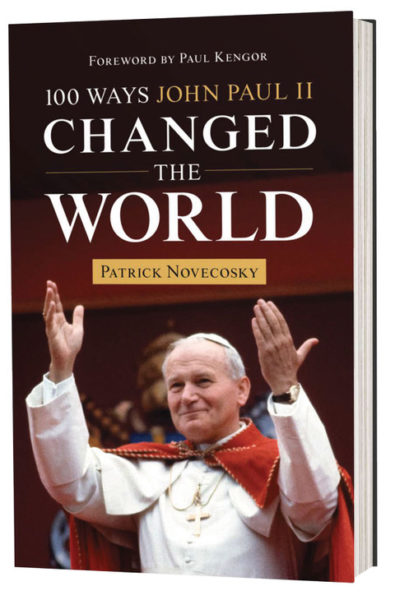Twenty-five years ago this Sunday, the Vatican published “We Remember: A Reflection on the Shoah,” one of John Paul’s many efforts to bring healing to the Catholic Church’s relations with the Jewish people.
by Patrick Novecosky
Pope John Paul II loved sports. As pope, he hiked and skied. He even built a swimming pool at his summer residence to stay in shape.
Soccer may have been his favorite sport. When young Karol Wojtyla and his Catholic friends engaged in a pickup game against the local Jewish boys, he always volunteered to play goalie for the other side to create even numbers.
Some of those Jewish boys remained lifelong friends with “Lolek the Goalie.”
During his formative years as a young priest, the future pope witnessed the horrors of the Second World War. He lived through the Nazi Holocaust and the post-war Soviet reign of terror. When he became pope, one of his fondest desires was to help heal the wounds of the genocide.
Twenty-five years ago this week, the Vatican published “We Remember: A Reflection on the Shoah,” one of John Paul’s many efforts to bring healing to the Catholic Church’s relations with the Jewish people.
“On numerous occasions during my Pontificate, I have recalled with a sense of deep sorrow the sufferings of the Jewish people during the Second World War,” he wrote in the 1998 document’s introduction. “The crime which has become known as the Shoah remains an indelible stain on the history of the century that is coming to a close.”
During his 26-year pontificate, John Paul worked to atone for the Catholic Church’s errors. He apologized to women, people convicted by the Inquisition, Muslims killed by Crusaders, and many others who suffered at the hands of the Church — including Jews.
John Paul not only apologized to Jews. His heart ached for them.
“It is my fervent hope that [this document] will indeed help to heal the wounds of past misunderstandings and injustices,” he wrote 25 years ago.
“May the Lord of history guide the efforts of Catholics and Jews and all men and women of good will as they work together for a world of true respect for the life and dignity of every human being, for all have been created in the image and likeness of God.”
A quarter century later, however, violent anti-Jewish sentiments are again on the rise.
In its latest audit last April, the Anti-Defamation League found that antisemitic events reached an all-time high in the U.S. in 2021, with 2,717 incidents of assault, harassment, and vandalism. This is the most incidents reported to ADL in a year since it began tracking in 1979.
Senior Catholic bishops — including Pope Francis — from around the world are urging Christians to fight this worldwide rise of antisemitism.
Archbishop Christophe Pierre, papal nuncio to the United States, emphasized the need to stand against increasing hostility to Jews.
“May today’s event help us ‘Never Again’ to choose violence against our brothers and sisters in the human family — ‘Never Again’ to turn a blind eye to such violence being enacted in our midst,” he said during an online event in February hosted by the Combat Antisemitism Movement.
The archbishop’s statement echoes John Paul II’s Oct. 9, 1988, address to Jewish leaders in Strasbourg, France.
“I repeat again with you the strongest condemnation of antisemitism and racism, which are opposed to the principles of Christianity.”
John Paul also took his efforts for reconciliation into the diplomatic realm. He established diplomatic relations between the Holy See and Israel in 1993 after the two states approved a Fundamental Accord.
“Jewish-Christian relations,” he said, “are never an academic exercise. They are, on the contrary, part of the very fabric of our religious commitments and our respective vocations as Christians and as Jews.”
During the Great Jubilee in 2000, he made his one and only papal visit to Israel. (He had gone on a pilgrimage to the Holy Land in 1963, shortly before being named archbishop of Kraków.)
During the papal visit, he prayed at Jerusalem’s Western Wall, leaving a written prayer expressing sorrow for Jews’ suffering at the hands of Christians. The most touching moment of the pilgrimage was his address at Yad Vashem, the Holocaust memorial in Jerusalem.
“I assure the Jewish people that the Catholic Church, motivated by the Gospel law of truth and love and by no political considerations, is deeply saddened by the hatred, acts of persecution, and displays of antisemitism directed against the Jews by Christians at any time and in any place.”
In 1991, Cristina Odone, then editor of the Catholic Herald, described John Paul’s long-standing passion “to place his Church at the heart of a new religious alliance that would bring together Jews, Muslims, and Christians in a great armada of God’s troops on earth.”
If the saintly pope’s passion is to be realized in our day and the poison of antisemitism is to be eliminated, it will take more than just diplomatic gestures. It will take a true conversion of heart for millions.
Like the young Karol Wojtyla, we must learn to “play goalie for the other side” by standing with the most vulnerable. Only then will John Paul’s passion become reality.
Patrick Novecosky is a Virginia-based journalist, author, international speaker, and pro-life activist. He met Pope St. John Paul II five times. His latest book is “100 Ways John Paul II Changed the World.” Catholic World Report originally published this article on March 11, 2023.


